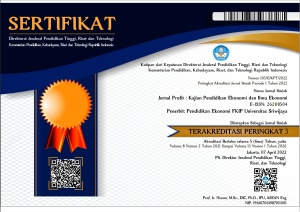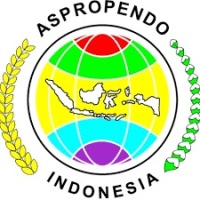THE INFLUENCE OF SOCIAL MEDIA, FAMILY ENVIRONMENT, AND SELF-EFFICACY ON STUDENTS' ENTREPRENEURIAL INTENTIONS AT NUSA CENDANA UNIVERSITY
DOI:
https://doi.org/10.36706/jp.v11i1.4Keywords:
family environment, social media, entrepreneurial interestAbstract
Salah satu permasalahan krusial yang dihadapi berbagai daerah adalah rendahnya minat berwirausaha. Berdasarkan masalah tersebut salah satu solusi yang tepat adalah dengan mengembangkan minat berwirausaha melalui Theory of Planned Behavior. Adapun fokus penelitian tertuju pada niat berwirausaha muda dengan sampel sebanyak 116 orang. Penelitian ini merupakan penelitian kuantitatif dengan metode expo facto dan menggunakan analisis jalur sebagai teknik analisisnya (Amos 21). Penelitian ini juga telah memenuhi syarat penelitian baik uji pra syarat penelitian maupun uji instrumen. Berdasarkan analisis tersebut diperoleh hasil bahwa terdapat pengaruh langsung yang positif dan signifikan (x1 dan x2) kecuali x3 pada Y (hanya mempengaruhi positif tetapi tidak sig). Hal serupa juga terlihat pada efek tidak langsung dimana efikasi dapat menjadi mediasi yang positif dan signifikan, baik di lingkungan keluarga maupun media sosial. Berdasarkan hasil tersebut dapat disimpulkan bahwa ketiga variabel tersebut dapat memberikan kontribusi yang baik terhadap pengembangan minat berwirausahaReferences
Abdelfattah, F., Al, H., & Al-brwani, R. M. (2022). Influence of Self-perceived Creativity and Social Media Use in Predicting E-Entrepreneurial Intention. International Journal of Innovation Studies, 6(3), 119–127. https://doi.org/10.1016/j.ijis.2022.04.003
Aini, S. N. arta, Purwana, D., & Saptono, A. (2015). Pengaruh Lingkungan Keluarga Dan Efikasi Diri Terhadap Motivasi Berwirausaha Pada Mahasiswa Fakultas Ekonomi Universitas Negeri Jakarta. Jurnal Pendidikan Ekonomi Dan Bisnis, 3(1), 22–50.
Ajzen. (2005). Attitudes, Personality and Behaviour (2nd ed.). Open University Press McGraw Hill Education.
Ajzen, I. (1991). The Theory of Planned Behavior. Organizational Behavior And Human Decision Processes, 50(2), 179–211. https://doi.org/10.1016/0749-5978(91)90020-T
Argyris, Y. E., & Xu, J. (2016). Enhancing self-efficacy for career development in Facebook. Computers in Human Behavior, 55, 921–931. https://doi.org/10.1016/j.chb.2015.10.023
Bandura, A. (1997). Self Efficacy: the Exercise of Control. W. H. Freeman.
Chen, L. (2013). IT entrepreneurial intention among college students: An empirical study. Journal of Information Systems Education, 24, 233–242.
Chen, S. C., & Lin, C. P. (2019). Understanding the effect of social media marketing activities: The mediation of social identification, perceived value, and satisfaction. Technological Forecasting and Social Change, 140, 22–32. https://doi.org/https://doi.org/10.1016/j.techfore.2018.11.025
Criaco, G., Sieger, P., Wennberg, K., Chirico, F., & Minola, T. (2017a). Parents’ performance in entrepreneurship as a “double-edged sword” for the intergenerational transmission of entrepreneurship. Small Business Economics, 49(4), 841–864. https://doi.org/10.1007/s11187-017-9854-x
Criaco, G., Sieger, P., Wennberg, K., Chirico, F., & Minola, T. (2017b). Parents’ performance in entrepreneurship as a “double-edged sword” for the intergenerational transmission of entrepreneurship. Small Business Economics, 49(4), 841–864. https://doi.org/10.1007/s11187-017-9854-x
Dewi, W. S., Pradana, M., & Sari, D. (2021). The Influence of Knowledge, Social Media Utilization and Motivation on Entrepreneurial Intention (Case Study: Telkom University Students). Proceedings of the 11th Annual International Conference on Industrial Engineering and Operations Management, 6840–6847.
Dhitara, P. Y. A., & Ardiansyah, E. H. (2022). Pengaruh Use of Sosmed dan Motivasi Berwirausaha Terhadap Minat Berwirausaha Melalui Variabel Intervening Efikasi Diri. Jurnal Sosial Ekonomi Dan Humaniora, 8(1), 1–12. https://doi.org/10.29303/jseh.v8i1.26
Drummond, C., McGrath, H., & O’Toole, T. (2018). The impact of social media on resource mobilisation in entrepreneurial firms. Industrial Marketing Management, 70, 68–89. https://doi.org/https:// doi.org/10.1016/j.indmarman.2017.05.009
Elnadi, M., & Gheith, M. H. (2021). Entrepreneurial ecosystem, entrepreneurial self-efficacy, and entrepreneurial intention in higher education: Evidence from Saudi Arabia. The International Journal of Management Education, 19(1), 100458. https://doi.org/https://doi.org/10.1016/j.ijme.2021.100458
Fajarina, Firmansyah, A., Ballian Siregar, & Yustiawati. (2021). Fenomena Adiksi Penggunaan Media Sosial Youtube Pada Remaja Usia 15-19 Tahun (Studi Fenomenologi Di Rw 18, Dasana Indah. Forum Ilmiah Volume, 18(1), 41–54.
Farrukh, M., Khan, A. A., Shahid Khan, M., Ravan Ramzani, S., & Soladoye, B. S. A. (2017). Entrepreneurial intentions: the role of family factors, personality traits and self-efficacy. World Journal of Entrepreneurship, Management and Sustainable Development, 13(4), 303–317. https://doi.org/10.1108/WJEMSD-03-2017-0018
Gavino, M. C., Williams, D. E., Jacobson, D., & Smith, I. (2019). Latino entrepreneurs and social media adoption: personal and business social network platforms. Management Research Review, 42(4), 469–494. https://doi.org/10.1108/MRR-02-2018-0095
Gunarso, M. T., & Selamat, F. (2020). The Influence of Entrepreneurial Education, and Family Background on Entrepreneurship Intention with Self-efficacy as a Mediating Variable in Final Year Undergraduate Students in Jakarta. Proceedings of the 2nd Tarumanagara International Conference on the Applications of Social Sciences and Humanities (TICASH 2020), 478(Ticash), 624–628. https://doi.org/10.2991/ assehr.k.201209.097
Hasanah, N. (2019). Pengaruh Dukungan dan Penerimaan Orang tua terhadap Efikasi Diri pada Anak Usia Dini. ThufuLA: Jurnal Inovasi Pendidikan Guru Raudhatul Athfal, 7(2), 309–324. https://doi.org/10.21043/thufula.v7i2.6092
Hieu, L. Q., & Loan, N. T. (2022). Role of Entrepreneurial Competence, Entrepreneurial Education, Family Support and Entrepreneurship Policy in Forming Entrepreneurial Intention and Entrepreneurial Decision. Pakistan Journal of Commerce and Social Science, 16(1), 204–221.
Hsu, D. K., Wiklund, J., Anderson, S. E., & Coffey, B. S. (2016). Entrepreneurial Exit Intentions and The Business-family Interface. Journal of Business Venturing, 31(6), 613–627. https://doi.org/10.1016/j.jbusvent.2016.08.001
Huang, Y., & Zhang, J. (2020). Social Media Use and Entrepreneurial Intention: The Mediating Role of Self-Efficacy. Social Behavior and Personality, 48(11), 1.
Ibrahim, W. N. A., Bakar, A. R., Asimiran, S., Mohamed, S., & Zakaria, N. S. (2015). Impact of Entrepreneurship Education on the Entrepreneurial Intentions of Students in Technical and Vocational Education and Training Institutions (TVET) In Malaysia. International Education Studies, 8(12), 141. https://doi.org/10.5539/ies.v8n12p141
Kirana, D. G. C., Harini, & Nugroho, J. A. (2018). Pengaruh Pendidikan Kewirausahaan dan Self -Efficacy Terhadap Minat Berwirausaha (Studi Pada Mahasiswa Program Studi Pendidikan Ekonomi Tahun Angkatan 2014-2016). BISE: Jurnal Pendidikan Bisnis Dan Ekonomi, 4(1), 1–14.
Laksmi, P. P. D., Suniasih, N. W., & Ngurah Wiyasa, K. (2018). Pengaruh Pola Asuh Orang Tua terhadap Efikasi Diri. Jurnal Penelitian Dan Pengembangan Pendidikan, 2(1), 81–87. https://doi.org/10.23887/mi.v23i1.16410
Laspita, S., Breugst, N., Heblich, S., & Patzelt, H. (2012). Intergenerational transmission of entrepreneurial intentions. Journal of Business Venturing, 27(4), 414–435. https://doi.org/https:// doi.org/10.1016/j.jbusvent.2011.11.006
Lin, C., Pan, Y., Yu, Y., Feng, L., & Chen, Z. (2023). The influence mechanism of the relationship between entrepreneurial learning and entrepreneurial intention. Frontiers in Psychology, 13(January), 1–13. https://doi.org/10.3389/fpsyg.2022.1023808
Maftuhah, R., & Suratman, B. (2017). Pengaruh Efikasi Diri, Lingkungan Keluarga, Dan Pengetahuan Kewirausahaan Terhadap Minat Berwirausaha Siswa Smk Di Sidoarjo. Jurnal Ekonomi Pendidikan Dan Kewirausahaan, 3(2), 121. https://doi.org/10.26740/jepk.v3n2.p121-131
Mamun, A., che nawi, N., Dewiendren, A., & Shamsudin, S. F. F. (2016). Examining the Effects of Entrepreneurial Competencies on Students’ Entrepreneurial Intention. Mediterranean Journal of Social Sciences, 7, 119–127. https://doi.org/10.5901/mjss.2016.v7n2p119
Muwardi, E. S., & Muhson, A. (2020). Pengaruh Lingkungan Keluarga, Efikasi Diri Dan Prestasi Belajar Ekonomi Terhadap Perilaku Anti Korupsi. Jurnal Ekonomi Dan Pendidikan, 16(1), 16–23. https://doi.org/10.21831/jep.v16i1.23572
Pekkala, K., & Van Zoonen, W. (2022). Work-related social media use: The mediating role of social media communication self-efficacy. European Management Journal, 40(1), 67–76. https://doi.org/10.1016/j.emj.2021.03.004
Pittino, D., Visintin, F., & Lauto, G. (2018). Fly Away From the Nest? A Configurational Analysis of Family Embeddedness and Individual Attributes in the Entrepreneurial Entry Decision by Next-Generation Members. Family Business Review, 31(3), 271–294. https://doi.org/10.1177/0894486518773867
Prayoga, M. L., Muchtolifah, & Sishadiyati. (2021). Faktor Kemiskinan Di Kabupaten Sidoarjo. Jambura Economic Education Journal, 3(2), 135–142. https://doi.org/10.37479/jeej.v3i2.11058
Priseptian, L., & Primandhana, W. P. (2022). Analisis Yang Mempengaruhi Kemiskinan. Forum Ekonomi, 24(1), 45–53.
Schoon, I., & Duckworth, K. (2012). Who becomes an entrepreneur? Early life experiences as predictors of entrepreneurship. Developmental Psychology, 48(6), 1719–1726. https://doi.org/10.1037/a0029168
Silveyra, G., Rodríguez-Aceves, L., Charles-Leija, H., & Saiz-Álvarez, J. M. (2021). Human flourishing: an enabler of entrepreneurial intention in Latin American students. European Business Review, 33(6), 999–1018. https://doi.org/10.1108/EBR-11-2020-0283
Suarmini, N. W. (2014). Keluarga Sebagai Wahanan Pertama Dan Utama Pendidikan Karakter Anak. Jurnal Sosial Humaniora, 7(1), 118–135. https://doi.org/10.12962/j24433527.v7i1.599
Supeni, R. E., & Efendi, M. (2017). Minat Mahasiswa dalam Berwirausaha pada Perguruan Tinggi Swasta di Kabupaten Jember. Prosiding Seminar Nasional Dan Call For Paper Ekonomi Dan Bisnis, 1, 449–463.
Tackie, D. N. (2021). An Examination of Poverty: Dimensions, Causes, and Solutions. Journal of Rural Social Sciences, 36(2), 1–25. https://egrove.olemiss.edu/jrss/vol36/iss2/2
Wardani, K. A., Iswinarti, I., & Karmiyati, D. (2019). Peran Efikasi Diri dalam Memediasi Hubungan antara Keterlibatan Orang Tua dan Motivasi Berprestasi. Mediapsi, 5(2), 74–87. https://doi.org/10.21776/ub.mps.2019.005.02.2
Wasty Soemanto. (2008). Pendidikan Wiraswasta. PT.Bumi Aksara.
Downloads
Published
How to Cite
Issue
Section
License
Copyright (c) 2024 Markus U. K. Yewang, fernando saragih, Rolens E. H. Riwu Manu, Agustina Butar-butar, Mises B. C. Abineno , Ari Data

This work is licensed under a Creative Commons Attribution-ShareAlike 4.0 International License.














